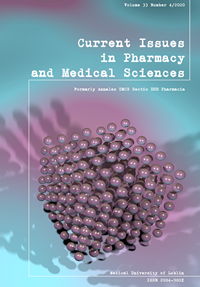The effect of Ketogenic diet on vitamin D3 and testosterone hormone in patients with diabetes mellitus type 2
DOI:
https://doi.org/10.2478/cipms-2020-0033Keywords:
testosterone, lipid profile, Ketogenic dietAbstract
A keto diet is well-known for being a low carb diet in which the body produces ketones in the liver to be used as energy. When something high in carbs is eaten, the body will produce glucose and insulin. Glucose is the easiest molecule for the body to convert and use as energy, so it will be chosen over any other energy source. The aim of this study is to examine the effect of a ketogenic diet on type 2 diabetic patients and the effect it has on testosterone, vitamin D3, HDL, LDL levels, in comparison to non-ketogenic diet subjects. In the study, Type 2 diabetic patients undergoing a keto diet were selected and serum D3 levels and testosterone levels were examined and compared with control subjects. The result show a significant increase in testosterone hormone in patients with diabetes mellitus type 2 following a Ketogenic diet (mean± Std. Error 427.4±2.52) as compared with the control group (mean ± Std. Error 422.2±0.24) and as compared with patients with diabetes mellitus type 2 who are not following a Ketogenic diet (mean± Std. Error 151.4±1.41). The results show no significant level in LDL level in patients with diabetes mellitus type 2 following a Ketogenic diet (mean ± Std. Error 78.53±0.17), as compared to a control group (mean ± Std. Error 75.0.3±0.14) and no significant level in HDL level in patients with diabetes mellitus type 2 following a Ketogenic diet (mean± Std. Error 46.3±1.55), as compared with a control group (mean ± Std. Error 46.2±2.43), and with patients with diabetes mellitus type 2 who are not following a Ketogenic diet (mean ± Std. Error 45.1±1.55) . The results show a significant increase in vitamin D3 level in patient with diabetes mellitus type 2 who are following a Ketogenic diet (mean ± Std. Error 53.5±0.32), as compared with a control group (mean± Std. Error 57±0.24), and with patients with diabetes mellitus type 2 who are not following a Ketogenic diet (mean ± Std. Error 25.1±1.55). Herein, normal vitamin D3 levels in patients corresponds to normal testosterone hormone levels. In conclusion, this study shows that in patients with diabetes mellitus type 2, following a ketogenic diet has a positive effect on the patients’ health.
References
1. Hamada T, Hayashi T, Kimura T, Nakao K, Moritani T. Electrical stimulation of human lower extremities enhances energy consumption, carbohydrate oxidation, and whole body glucose uptake. J App Physiol. 2004:911-6.
2. Fabbrini E, Faidon M, Mohammed BS, Pietka T, Abumrad NA, Patterson BW, Okunade A, Klein S. Intrahepatic fat, not visceral fat, is linked with metabolic complications of obesity. PNAS. 2009;106(36):15430-5.
3. Chu S, Majumdar A. Opportunities and challenges for a sustainable energy future. Nature. 2012;488(7411):294-303.
4. Paoli A. Ketogenic diet for obesity: friend or foe? IJERPH. 2014; 11(2):2092-107.
5. Bozzetto L, Prinster A, Annuzzi G, Costagliola, L, Mangione A, Vitelli A, et al. Liver fat is reduced by an isoenergetic MUFA diet in a controlled randomized study in type 2 diabetic patients. Diabetes care. 2012;35(7):1429-35.
6. Leist BM, Single B, Castoldi AF, Kühnle S. A Switch in the decision between apoptosis and necrosis. J Exp Med. 1997;185(8):1481-6.
7. DiMeglio LA, Imel EA. Calcium and phosphate: hormonal regulation and metabolism. In Basic and applied bone biology. Academic Press. 2019:257-82.
8. Pritchard L, Lewis S, Hickson M. Comparative effectiveness of vitamin D supplementation via buccal spray versus oral supplements on serum systematic review protocol. JBI Evidence Synthesis. 2019;17(4):487-99.
9. Marquina C, Mousa A, Scragg R, De Courten B. Vitamin D and cardiometabolic disorders : a review of current evidence, genetic determinants and pathomechanisms. Obesity Rev. 2019;20(2):262-77.
10. Jueraitetibaike K, Zheng D, Dan-Dan W, Long-Ping P, Jun J, Li C, et al. The effect of vitamin D on sperm motility and the underlying mechanism. AJA. 2019;21(4):400.
11. Cito G, Cocci A, Micelli E, Gabutti A, Russo GI, Coccia ME, et al. Vitamin D and male fertility: an updated review. World J Men’s Health. 2020;38(2):164-77.
12. Harchegani AB, Irandoost A, Mirnamniha M, Rahmani H, Tahmasbpour E, Shahriary A. Possible mechanisms for the fffects of calcium deficiency on male infertility. Int J Fertil Steril. 2019; 12(4):267.
13. Tang R, Shen Y, Wang M, Zhou H, Zhao Y, Wang M. Highly efficient synthesis of boldenone from androst-4-ene- 3, 17-dione by Arthrobacter simplex and Pichia pastoris ordered biotransformation. Bioproc Biosyst Eng. 2019;42(6):933-40.
14. Schulz RW, Taranger GL, Bogerd J, Nijenhuis W, Norberg B, Male R, Andersson E. Entry into puberty is reflected in changes in hormone production but not in testicular receptor expression in Atlantic salmon (Salmo salar). Reprod Biol Endocrinol. 2019;17(1):48.
15. Chung JY, Brown S, Chen H, Liu J, Papadopoulos V, Zirkin B. Effects of pharmacologically induced leydig cell testosterone production on intratesticular testosterone and spermatogenesis Jin-Yong Chung. BOR. 2020;102(2):489-98.
16. Article R. Biological and psychological influences of cross- sex hormone in transgender. Med Health. 2019;14(1):1-22.
17. Santos HO. Ketogenic diet and testosterone increase: Is the increased cholesterol intake responsible? To what extent and under what circumstances can there be benefits. IJEM. 2017;16(3):266-70.
18. Dashti HM, Mathew TC, Khadada M, Al-Mousawi M, Talib H, Asfar SK. Beneficial effects of ketogenic diet in obese diabetic subjects. Mol Cell Biochem. 2007;302(1-2):249-56.
19. Huynh T, Rm G, Nyunt O, Bowling F, Cowley D, Gm L. The association between ketoacidosis and 25 ( OH ) – vitamin D 3 levels at presentation in children with type 1 diabetes mellitus. Pediat Diabetes. 2009;10(1):38-43.
Downloads
Published
Issue
Section
License
Copyright (c) 2021 Authors

This work is licensed under a Creative Commons Attribution-NonCommercial-NoDerivatives 3.0 Unported License.


